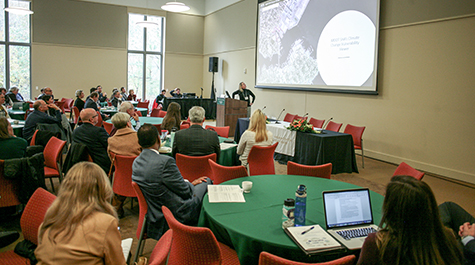Seventh Annual Coastal Policy Conference Examines the Three Ps of Resilience
William & Mary Law School’s Virginia Coastal Policy Center (VCPC) has for several years brought together leading experts largely from academia, the government and the nonprofit sector to work on solutions to the problem of climate change.
During this year’s November 15 conference—“The Three Ps of Resilience: Planning, Partnerships, and Paying for it All”—representatives from business and banking played a more prominent role.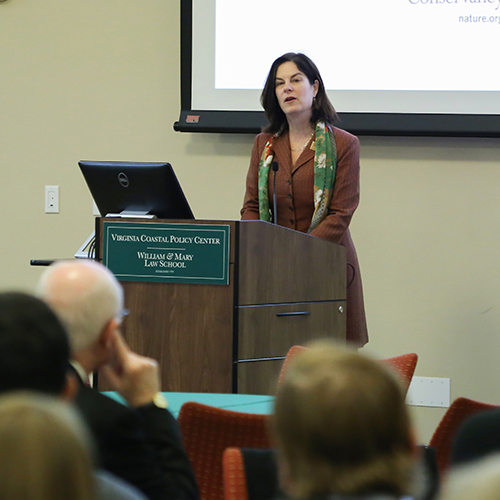
“This gathering is an important reminder that our work is strengthened by collaboration, by communication, and by public-private partnerships,” said William & Mary President Katherine Rowe as she welcomed guests. “Everything that we can do consortially is what will matter in the next decade.”
With a room full of experts from New England to Florida, Elizabeth Andrews, Director of the VCPC and host of the day-long event, promised a “wonderful interstate interdisciplinary dialogue.” She also urged the many attendees to “take advantage of all the brain power in this room.”
And the b rain power was considerable. Admiral (Ret.) Ann Phillips, Special Assistant to the Governor for Coastal Adaptation and Protection, provided the morning keynote with a discussion of the development of Virginia’s Coastal Resilience Master Plan. And in the afternoon, Leonard Jones, Managing Director of the U.S. Public Finance Group at Moody’s Investors Service, went into great detail about how climate change impacts are considered in the credit rating process.
rain power was considerable. Admiral (Ret.) Ann Phillips, Special Assistant to the Governor for Coastal Adaptation and Protection, provided the morning keynote with a discussion of the development of Virginia’s Coastal Resilience Master Plan. And in the afternoon, Leonard Jones, Managing Director of the U.S. Public Finance Group at Moody’s Investors Service, went into great detail about how climate change impacts are considered in the credit rating process.
During the morning, too, great buzz was generated when Virginia’s Secretary of Natural Resources and Chief Resilience Officer Matthew J. Strickler announced that Governor Ralph Northam had just signed Executive Order Forty-Five, creating the Virginia Flood Risk Management Standard. This initiative fulfills commitments in Executive Order Twenty-Four, which is among the most comprehensive climate change protections undertaken by any state. (Governor Northam signed Executive Order Twenty-Four during the 2018 VCPC conference.)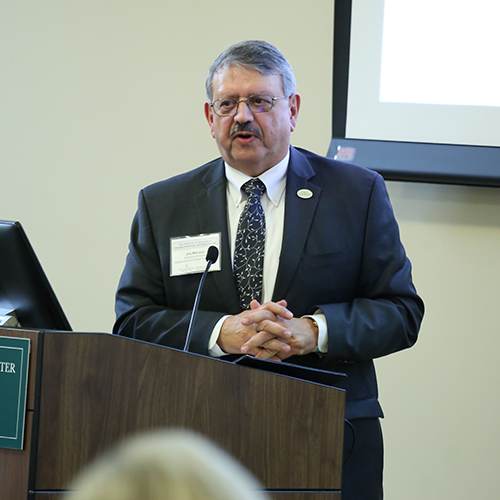
“The new Virginia Flood Risk Management Standard is another step in Virginia’s ongoing efforts to protect life and property from climate change,” Strickler said. “Virginia is leading the nation, and this standard will protect Virginians from future costs that climate change will bring.”
The Executive Order will improve flood protection in flood prone areas across the state, further encouraging smart and resilient construction of state buildings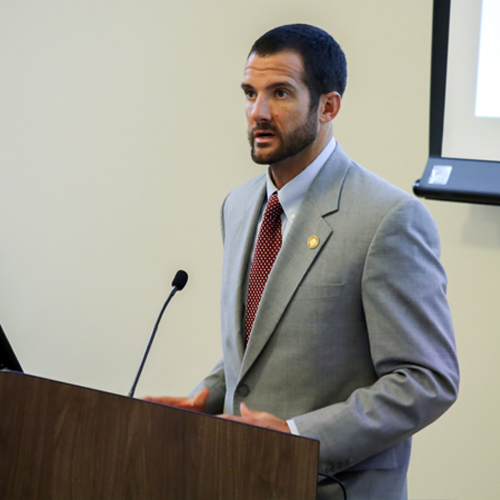 . It establishes a “freeboard” standard that increases protection of state-owned buildings in coastal and riverine floodplains. A first of its kind for any state, the standard incorporates science-based sea level rise projections that the National Oceanic and Atmospheric Administration has developed and adopted. The standard requires that state-owned buildings are built to certain elevation standards to protect them from flooding.
. It establishes a “freeboard” standard that increases protection of state-owned buildings in coastal and riverine floodplains. A first of its kind for any state, the standard incorporates science-based sea level rise projections that the National Oceanic and Atmospheric Administration has developed and adopted. The standard requires that state-owned buildings are built to certain elevation standards to protect them from flooding.
The new standards will apply to all state-owned buildings authorized for construction after January 1, 2021.
A number of panels were held during the day, bringing a wealth of perspectives and new ideas. Videos and presentations from the event will be available soon.
- Resilience Planning in Northeastern Coastal States - Moderator: Joe Maroon (Executive Director, Virginia Environmental Endowment), John Cleveland (Executive Director, Boston Green Ribbon Commission), Sandy Hertz (Assistant Director for Environmental Programs, Maryland Department of Transportation), and Shaun O’Rourke (Rhode Island Chief Resiliency Officer and Director, Stormwater Resiliency, Rhode Island Infrastructure Bank).
- Resilience Funding Efforts in the Banking Industry - Moderator: David Johnston (Chief Executive Officer, Hamilton Advisors LLC and Senior Advisor, Michael W. Lowder & Global Associates, LLC), Jim Hansen (Regional President, Eastern Carolinas Market, PNC Financial Services), Nathalia Artus (Vice President, Community Development, Atlantic Union Bank), and Jeanne Milliken Bonds (Professor of the Practice, University of North Carolina, Kenan-Flager School of Business [formerly Community Development, Federal Reserve Bank of Richmond].)
- Resilience Planning in Southeastern Coastal States - Moderator: George Homewood (Director of Planning, City of Norfolk, Virginia), Dr. Jennifer Jurado (Chief Resilience Officer and Director of the Environmental Planning and Community Resilience Division, Broward County, Florida), Amanda Martin (Deputy Chief Resilience Officer, North Carolina Office of Recovery and Resiliency), and Mark Wilbert (Chief Resilience Officer and Director of Emergency Management, Charleston, South Carolina).
- Resilience Planning & Partnership Efforts in the Private Sector - Moderator: Dennis Treacy (Senior Counsel, Government Relations and Administrative Law Group, Reed Smith LLP), Jason Ericson (Manager, Power Generation & Environmental Compliance, Dominion Energy), Shannon Murphy (Director, Support Services, Sentara Norfolk General Hospital), and Jim O’Brien (Director of Facilities, Newport News Shipbuilding).
The event, chock-full of information and questions from the audience, left little down time. During a working lunch, attendees received a guest video appearance by U.S. Senator Mark Warner, wh o said that fighting climate change and building resilience requires more than a federal approach.
o said that fighting climate change and building resilience requires more than a federal approach.
“It’s something that we all must work for, from local and state governments, to folks in academia, to nonprofits and the business sectors; no one sector can do this work alone,” Warner said. “That’s why I’m so encouraged by your participation in this conference today. By building partnerships and looking at real solutions and sources of funding, you’ll be able to pave the way forward for the future of resilience in the Commonwealth.”
Warner’s hopeful message segued nicely to several William & Mary Law students sharing climate change-related projects carried out through the VCPC.
“This generation of students is incredibly interested in climate-change-related issues,” said William & Mary Law Dean Davison D ouglas. “These students are engaged in public policy issues that are vital today.”
ouglas. “These students are engaged in public policy issues that are vital today.”
By day’s end, Elizabeth Andrews looked back on another successful VCPC conference, and pondered a few of the many takeaways.
“We have a new flood risk management standard, so thank you Governor Northam, Secretary Strickler, and Admiral Phillips for that important step forward,” Andrews said. “And our comrade coastal states are doing some impressive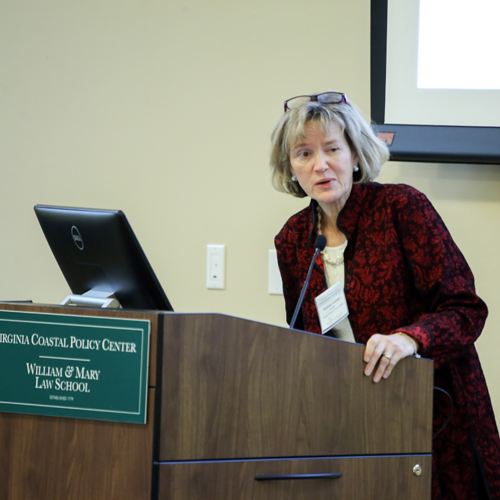 things for resilience, but no one seems to have an easy answer for how to fund it all.”
things for resilience, but no one seems to have an easy answer for how to fund it all.”
Andrews got a laugh when she admitted climate change and resiliency experts don’t know enough about banking, but she considers it a good starting point for future discussions about how localities can partner with banks and the private sector in this endeavor.
“We need the business community—the private sector—at the table,” Andrews concluded. “We need their leadership, we need their resources, we need their expertise.”
~~~
This year’s conference is the VCPC’s seventh annual conference. Previous conferences (sponsored by the Virginia Environmental Endowment) include: “Adaptive Planning for Flooding & Coastal Change in Virginia” (2013); “Adaptive Planning for Flooding and Coastal Change in Virginia: Next Steps for the Commonwealth” (2014); “Show Me the Money: The Economic Realities of Responding to Coastal Change and Adaption in Virginia” (2015); “Living with the Water – Too Much, and Too Little” (2016); “Defending Our Coasts: Ensuring Military Readiness and Economic Viability As Waters Rise” (2017); and “Building a Resilient Virginia” (2018).
About the Virginia Coastal Policy Center
The Virginia Coastal Policy Center (VCPC) is a partnership between the Virginia Institute of Marine Science (VIMS), the Virginia Sea Grant Program, and William & Mary Law School. VCPC provides science-based legal & policy analysis of issues affecting the state’s coastal resources; educates future citizen lawyers; and offers advice to a host of Virginia’s decision-makers, from government and military officials and legal scholars to non-profit and business leaders.
About William & Mary Law School
Thomas Jefferson founded William & Mary Law School in 1779 to train leaders for the new nation. Now in its third century, America's oldest law school continues its historic mission of educating citizen lawyers who are prepared both to lead and to serve.
